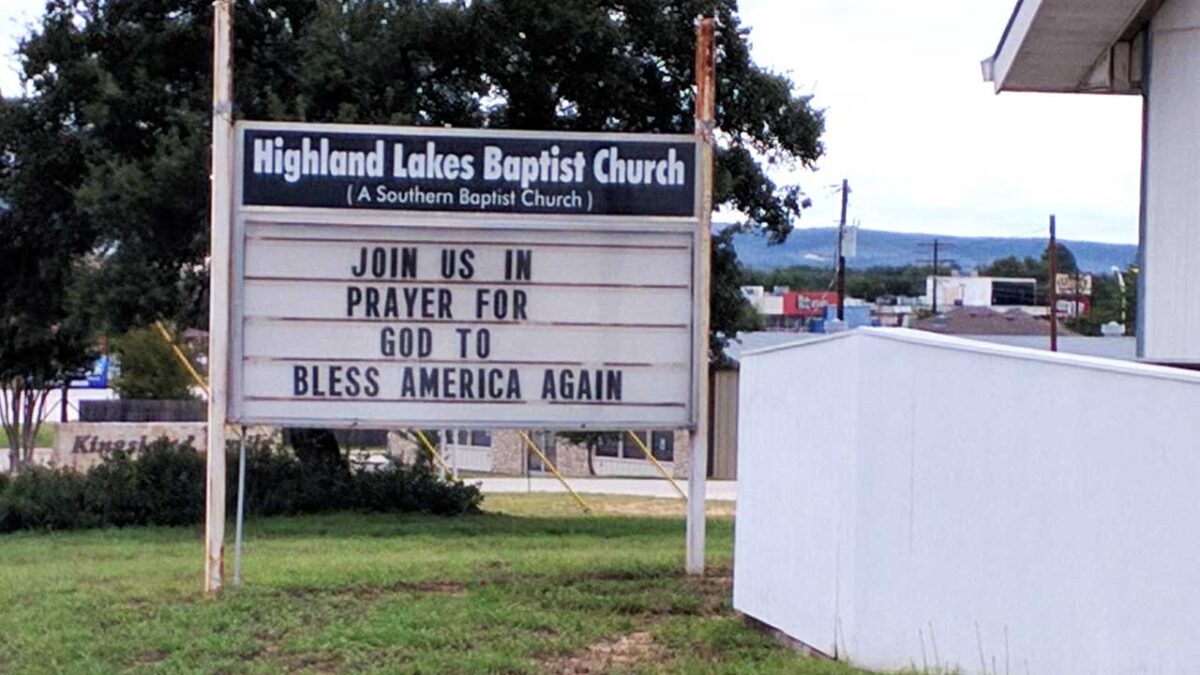
Liberation theology is in the news again, as Pope Francis days ago tossed his own “October surprise” into the American election in the form of “Fratelli Tutti.” While pundits debate the encyclical’s possible effect on the Nov. 3 election, the circular letter, which rails at capitalism as inadequate to meet basic human needs, provides further evidence of this pope’s leftist leanings and earned immediate praise from one of liberation theology’s founding fathers, Leonardo Boff.
Since the George Floyd death in late May, Protestant and Catholic faith leaders have been commenting on race. Anglican pastors have said racism is structural and systematic in society. A Catholic priest in El Paso knelt in honor of Floyd and received a complimentary phone call from the pope. Two seminaries, Virginia Theological Seminary and Princeton Theological Seminary, muse about ponying up millions in guilt money for sins committed more than 150 years ago.
Liberation theology might travel under various aliases these days—prophetic Christianity, “woke” theology, “speaking truth to power”—but its basic tenets harken to the 1960s, when Latin American Catholic priests had grown weary of directives from the hierarchy that did not address the plight of people on the ground. They invented a “theology from below” that attempted to minister directly to the physical needs of common people.
Since its 1968 inception at a conference of Catholic bishops in Medellín, Colombia, the basic concept has divided into many branches, each speaking to a particular group. Currently, practically every aggrieved group in our society has its own “liberation” theology; these include black theology, feminist theology, queer theology, Minjung theology, womanist theology, and the list goes on.
Detractors have tried to point out this idea’s litany of shortcomings and negative effects. For starters, the only thing it accomplishes is a switch of oppressors, as the currently oppressed become the new oppressors. Then there are its roots in Marxism, that it includes an unbiblical “preferential option for the poor,” and that the kingdom of God is to be achieved in this world. Beyond these critiques, there are five, current, practical dangers that should convince most traditional Christians to steer clear of this misguided philosophy.
1. Placing the Temporal Over the Eternal
Feminist theology focuses on respect in society for women, and queer theology on respect for gay and transgender persons. These theologies privilege change in society — sociopolitical advancement — over the forgiveness of sins and eternal life with God the Creator.
In its original incarnation, and as it applies to the underclass and minorities today, liberation theology is not only this-worldly but also materialistic. It emphasizes the transfer of physical resources — money and possessions — from one group that has them to another group that does not.
Christianity, in its essence, focuses on our vertical relationship with God the almighty
Creator and our need to be saved from our sin. Contingent factors are cast as secondary — race, physical characteristics, influence in society, economic position. What matters is one’s status and condition before God.
The big question for every Christian throughout history has been: Where will you spend eternity? That destination does not depend on whether you are respected in your job or at your school, or whether your bank account is as healthy as the person sitting in the cubicle next to you.
The temporal needs of this life are certainly integral to Christian belief, and we, as Christians, attend to the whole person. But concern for the body and its needs is generated by spiritual belief.
The crux of liberation theology, however, is that the have-nots in this life should receive from the haves more material, goods, money, and services. It is a theology that addresses temporal, worldly concerns. It is, in short, focused on money.
Jesus warned often about the dangers of material wealth. He said the rich would have a very tough time getting into the kingdom of God. He told his disciples to store up treasures in heaven, not on earth. Many of his parables emphasized the dangerous allure of material wealth. His disciples gave up everything they had to follow him.
No group in American society has demonized wealth as vociferously as has the left. One gets the impression that those who have it are evil (unless, of course, they are of the left); the corporations in which they gained it are evil; how it is generated is evil. How ironic that the religion of the left, the social-justice faith, is focused primarily on this wealth. You might even want to call liberation theology a “prosperity gospel.”
The otherworldly emphasis is frequently condemned by the religious left, because it distracts from activist-driven, worldly activity. Thinking about heaven and its future glory makes the poor forget about the earth and its present inequality and unfairness. It pacifies the poor into complacency about their current “oppressed” condition.
C.S. Lewis wrote profoundly about just this issue: “If you read history you will find that the Christians who did most for the present world were precisely those who thought most of the next. It is since Christians have largely ceased to think of the other world that they have become so ineffective in this.”
2. Rendering Evangelism Moot
If otherworldly concerns are de-emphasized and this-worldly matters stressed, what does that do to the doctrine of spreading the faith, so integral to historic Christianity that it comprised Jesus’s last words on earth? It moves it down the list of priorities, to a place below temporal welfare issues. Evangelism has to do with the hereafter; liberation theology has to do with this life, here on earth.
In the eyes of the left, evangelism — especially foreign evangelism — is complicit in several evil isms: whites evangelizing blacks smacks of racism; disciples from North America or Europe evangelizing native peoples smacks of colonialism and imperialism. And preaching the historic gospel — that Jesus is the only way to salvation — smacks of exclusivism.
Jesus told his followers to preach the gospel to every nation, to all people. The gospel is the good news that Jesus died for our sins and bodily rose to conquer physical death itself for all sinners. Persons in the third world need to hear that message as much as those in the first world do. And how can they hear if there are no preachers? Evangelism is integral to Christianity.
3. Focusing On the ‘Oppressors’
Like the Marxism that inspires it, liberation theology divides the world into two groups, the oppressed and the oppressors. The oppressed are victims of the oppressors, dependent upon them, held down and restricted by them. Liberation theology is for the oppressed.
Most of the books, speeches, and sermons of liberation theology, however, are directed toward the oppressors, the influential people in society, those with money and power. Granted, the “oppressed” may read these books and hear these sermons — in fact, given the antagonistic tone of most of them, they may be the only ones who read or hear them — but the audience is the “oppressors.” They are the ones who need to repent and give up their wealth.
True Christian theology is not divisive; it does not pit some of God’s creatures against others of God’s creatures. It unifies sinful people around Jesus Christ. And it speaks to all Christians, whatever their status or financial position — rich, poor, middle class, powerful, powerless — to bring them all into one unit, one body, the church.
Scripture does not approach wealth in the way the liberationists do. God may have a heart for the lesser advantaged in society — widows, orphans, strangers, the persecuted, the poor — but his heart for them does not come at the expense of his love for the rest of his creation.
In other words, there is no inherent virtue in being poor. The Bible lauds good rich people and good poor people alike. Similarly, the Bible condemns bad rich people and bad poor people alike. Churches portrayed in the New Testament had participants who were both well-to-do and poor.
Christianity also divides the world into two groups, but a different two groups: those still dead in their sins, and those who, by faith in Jesus Christ, are made righteous before God and made God’s friends by the gospel.
4. Sin Loses Its Punch
For all practical purposes, sin in liberation theology is corporate. To emphasize your individual sinfulness is to blame the victim. You are the sinned against, not the sinner.
A hallmark of true Christianity is the doctrine of individual sin. Jesus had plenty of opportunities to condemn systemic evil — such as the all-encompassing systemic evil of the Roman Empire — but he did not. Jesus condemned personal wrongdoing, such as pride, greed, unbelief. Confessing personal sin is the gateway in Christian theology to grace.
5. It Is Political
You pretty much have to become a political leftist to adopt and fully buy-in to liberation theory. Yes, some Christian social-justice warriors deny that politics has anything to do with justice, but that’s untrue. Writes Mark Tooley, “Christian social justice activism almost always focuses on racial, gender, poverty and immigrant injustice.”
Conservative justice issues — rights of the unborn, rights of the terminally ill, defense of the traditional family, and standing up for traditional sexual morality — are occasionally acknowledged in passing but hardly ever emphasized.
The theology of the social justice left has many theoretical liabilities, which should be taken on an abstract, philosophical level. But Christians intent on keeping the historic faith must become fully aware of liberation theology’s practical problems, and the debilitating effects it will have on their daily attempts to live out faith in Jesus.









